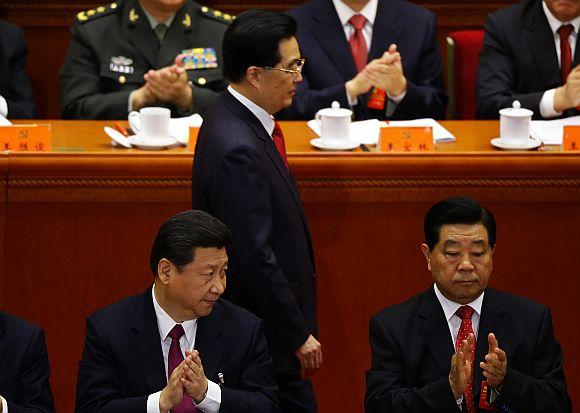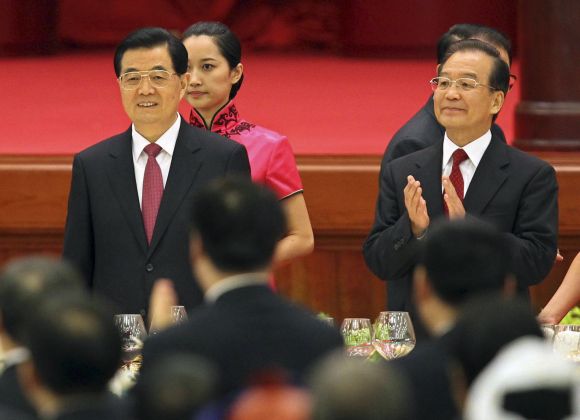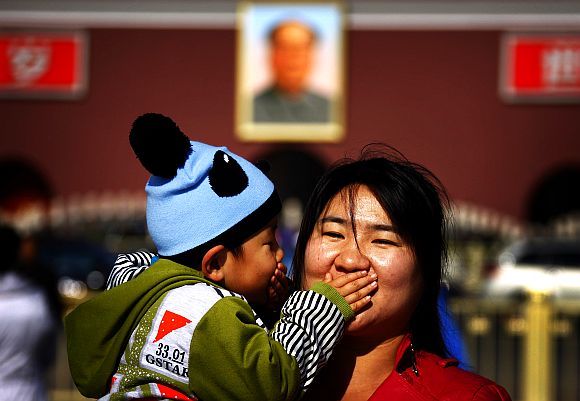
China's new leader in waiting, Xi Jinping will have a surprise head-start to emerge as the most influential leader, as outgoing President Hu Jintao has reportedly decided to step down from all posts including the all-powerful post of the military chief.
Xi, 59, currently the vice president, is expected to be formally nominated as the general secretary of the ruling Communist Party at the end of the ongoing 18th Communist Party Congress on its last day on November 14.
Scorching speculation, Hu has decided to formally relinquish his position as military chief at the end of the party Congress, Hong Kong-based 'South China Morning Post' quoted officials as saying.
Hu's decision to opt for complete retirement has surprised many analysts as he was expected to keep the top job of the chairman of the Central Military Commission, especially in the backdrop of recent reshuffling of military top brass which was packed with officials who worked closely with him.
Vice Premier, Li Keqiang, 57 regarded as successor to premier Wen Jiabao is also Hu's protege.
The Central Military Commission overseas all aspects of 2.3 million strong military. Xi is currently its vice chairman.
Turning 70 next month, Hu technically will be stepping down as party chief and as president after the Congress on November 14.
But the formal transfer of power was expected to take place early next year.
Please ...

Hu's complete departure from party and military is watched closely in India as he is widely regarded as one of post Mao Zedong Chinese leaders who rebalanced ties with India bringing an element of "strategic equilibrium" to otherwise pro-Pakistan Chinese foreign policy.
He is credited to have reset Sino-Indian ties, repairing the damage caused by the 1962 border war and improved ties.
Barring the problem of stapled visa to residents of Jammu and Kashmir in 2009, which China stopped after vociferous objections from New Delhi, a number of initiatives including agreement to prevent tensions at disputed borders provided a positive momentum to bilateral ties.
During the tenure of Hu and Premier Wen Jiabao, Sino-Indian trade touched an all time high of $73.90 billion last year.
Indian officials expect continuity of the policy as Xi and Li, who also the post-Kargil war Chinese leaders, are part of the process to improve Sino-Indian ties, even though they have not visited India in recent times.
Hu's departure will mark the first clean transfer of power the Communist Party has seen in two decades.
Please ....

This gives a head-start for Xi, unlike Hu when he was chosen as president 10 years ago as his predecessor, Jiang Zemin retained the post of head of the military for about two years after retirement, broadly retaining his influence over the party and the military, which unlike elsewhere in the world are part of the state structure in China.
Jiang, reportedly heading the Shanghai faction of the Communist Party also played a major role in the new leadership selection currently underway at the party Congress.
Xi was regarded as his protege as he previously headed the Shanghai Party unit before becoming vice president 10 years ago.
When he is formally declared as Hu's successor, Xi will get the posts of general secretary of the party, president of the country and chairman of the Military Commission, the Postsaid.
He could take over power formally early next year, as Hu, Wen and other top leaders are set to retire by the end of the year in what appears to be an orderly and smooth transition of power after the removal of hard-line Maoist leader Bo Xilai and purging of the party of his supporters.
Bo, 62 is currently awaiting his trial for a host of charges including sex, sleaze and covering up the role of his wife, Gu Kailai in the murder of a Briton, Neil Heywood who was reportedly British secret service MI6 agent.
Gu has been awarded a suspended death sentence.
Please ....

Hu's decision to quit from all posts looks as an attempt to retain his clean image, as Jiang's decision to cling on to power through back door even after retirement had become immensely unpopular and fuelled fierce criticism both inside and outside the party, the newspaper said.
Many accused Jiang of jeopardising leadership succession plans envisaged by late paramount leader Deng Xiaoping and upstaging Hu, who Deng anointed to succeed Jiang.
Hu is said to be keenly aware of the high stakes in his decision on whether to retain the post as chairman of the Military Commission, it said.
Image conscious Hu last week hit headlines with his speech at the inaugural day of the Party Congress warning leaders and cadre of how corruption which has become endemic among rank and file would result in the fall of both China and the party.
"For whatever reasons Hu chooses to relinquish his power, it would be an important incremental step that helps set a new precedent pointing to smooth transfer of power," Chen Ziming, a Beijing-based political observer told the daily.
"This is definitely Hu's boldest push for political reform, which has been stuck in an impasse during his tenure," he said.
Zhang Lifan, a Beijing-based historian said there is little doubt that Hu's departure would be good news for incoming leaders.
"The full retirement of Hu and other leaders will help strengthen the scope for their successors to run the country the way they intend," he said.
...